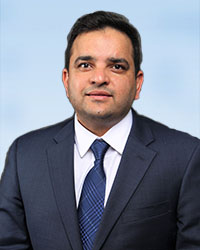At the WVU Medicine Advanced Center for Endoscopy, our team of physicians, nurses, and technicians provides comprehensive diagnosis and treatment for complex gastrointestinal diseases using an endoscope (a thin, flexible tube) to examine your gastrointestinal tract and perform minimally invasive procedures. With no incisions during these procedures, patients are at a lower risk for pain, bleeding, and infection than traditional surgery.
Our specialists use advanced therapeutic endoscopy, x-rays, and ultrasound to diagnose and treat gastrointestinal conditions. WVU Medicine advanced endoscopists provide some of the most innovative treatments, which are not available anywhere else in the area, and we are able to treat conditions where standard endoscopy and surgery may not be achievable. We combine innovation, education, research, and technology to provide the highest quality of patient care.
The WVU Medicine Advanced Center for Endoscopy uses the latest endoscopic technology to diagnose and treat problems in the liver, gallbladder, bile ducts, and pancreas with a procedure called endoscopic retrograde cholangiopancreatography (ERCP), which combines x-ray and the use of a unique FDA approved endoscope called a duodenoscope with a disposable cap. We’re among the first in the state and a few in the country who use the newest Olympus duodenoscope model, which is considered the gold standard for ERCP procedures to prevent procedure-related contamination and maximize patient safety. The sharp, clear, high-quality imaging from the duodenoscope allows us to easily view and observe your condition while providing the very best in patient care.
Advanced therapeutic endoscopy procedures WVU Medicine offers include:
- Endoscopic weight-loss procedures, non-surgical weight-loss procedures that use an endoscope through the mouth to reach the stomach
- Transoral incisionless fundoplication (TIF), a minimally invasive outpatient treatment to relieve symptoms of moderate to severe gastroesophageal reflux disease
- Balloon-assisted or deep enteroscopy, which is a safe procedure with risks similar to those for colonoscopy that uses a long endoscope into the small intestine for both diagnostic and therapeutic purposes that otherwise cannot be reached
- Cryoablation for Barrett’s esophagus to freeze away cancerous or damaged cells and stimulate the regrowth of normal cells
- Endoscopic mucosal resection, which is performed to remove precancerous, early-stage cancer, or other abnormal tissues from the digestive tract using specialized equipment and training
- Endoscopic necrosectomy, an advanced endoscopic outpatient procedure to remove infected pancreatic tissue caused by acute pancreatitis
- Endoscopic ultrasound (EUS), including therapeutic EUS, which is a minimally invasive procedure that uses high-frequency sound waves to produce detailed images and help providers assess and treat gastrointestinal, pancreatic inflammation/infection, and lung diseases
- Endoscopic ultrasound directed transgastric ERCP (EDGE), which provides access to the stomach without open surgery in order to alleviate bile duct, pancreas, and gall bladder issues after gastric bypass surgery
- Per-oral endoscopic myotomy (POEM) for swallowing disorders, such as achalasia, that allows the esophagus to function normally and pass food down into the stomach
- Radiofrequency ablation, which is a nonsurgical, minimally invasive procedure that uses frictional heat to burn away cancerous or damaged cells
Appointments and Directions
855-WVU-CARE 855-988-2273
Physician Office Center
1 Medical Center Drive
Morgantown, WV 26506
Clinic Number
Clinic Hours
Monday – Friday
8 am – 5 pm
WVU Medicine is proud to offer transoral incisionless fundoplication (TIF), an advanced endoscopy procedure for gastroesophageal reflux disease (GERD) that relieves symptoms without surgery. WVU Medicine gastroenterologists are the only trained and certified providers who perform the TIF procedure in West Virginia and the surrounding region.
Anti-reflux surgery has been used to effectively treat patients with GERD for over 50 years, but TIF is a less invasive option with fewer side effects and a quicker recovery period. This outpatient, minimally invasive procedure is performed under general anesthesia through the mouth with a thin, flexible tube called an endoscope. A WVU Medicine gastroenterologist feeds the endoscope through a special TIF device to repair the malfunctioning valve and block stomach acid from reaching the esophagus with forceps or fasteners instead of incisions.
You may be a candidate for TIF if:
- You regularly experience GERD symptoms of heartburn or regurgitation after eating.
- GERD medication is no longer effective for you.
- You continue to have GERD symptoms while on medication.
- You prefer not to undergo traditional anti-reflux surgery.
Schedule an evaluation with a WVU Medicine gastroenterologist today to find out if the TIF procedure is right for you.
Appointments and Directions
855-WVU-CARE (855-988-2273)
1 Medical Center Drive
Morgantown, WV 26506


